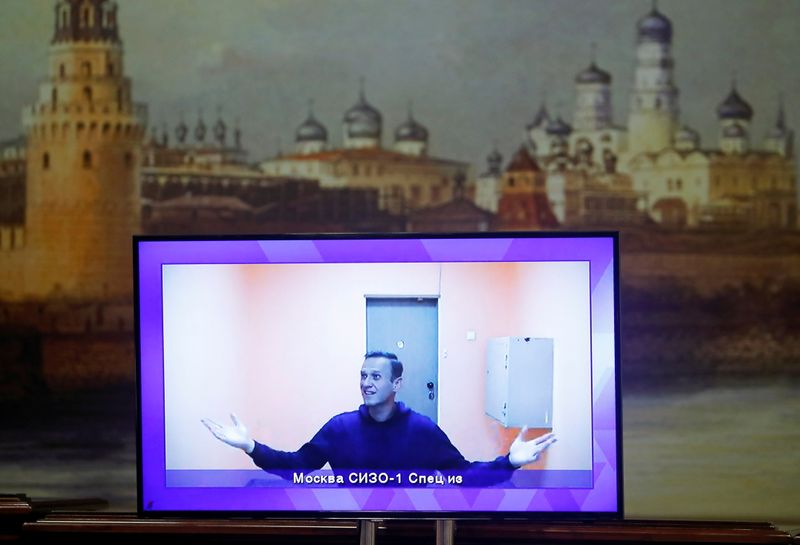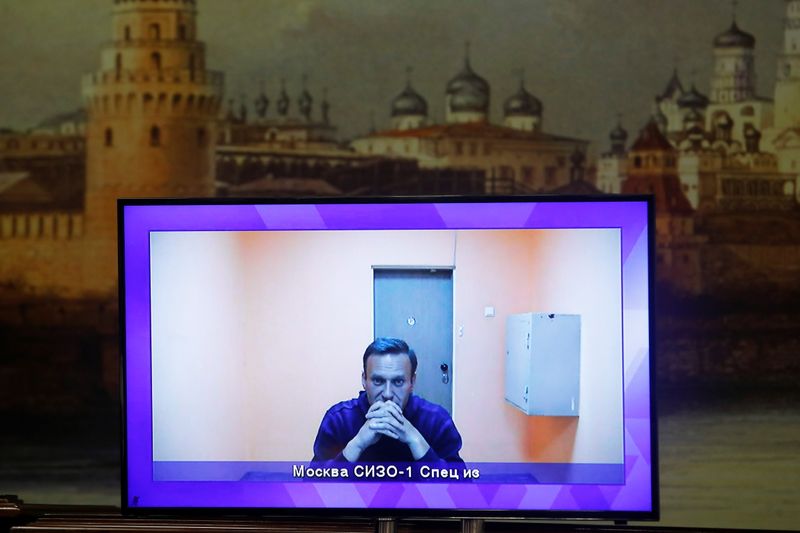By Maria Tsvetkova and Tom Balmforth
MOSCOW (Reuters) - A Russian court on Thursday ordered Kremlin critic Alexei Navalny to be kept in jail, rejecting an appeal against his detention and shrugging off calls by the West and tens of thousands of his Russian supporters for his release.
Navalny, a prominent critic of President Vladimir Putin, was remanded in custody for 30 days on Jan. 18 after flying back to Russia from Germany for the first time since being poisoned with a military-grade nerve agent in August.
A court at the time ordered him detained for alleged parole violations, which he denied. With various legal cases pending against him, Navalny, 44, could face years in jail. Tens of thousands of Russians protested against his jailing on Saturday.
Navalny appeared in court on Thursday by video link from jail, railing against what he called absurd allegations trumped up by authorities to sideline him for political reasons.
"You won't succeed in frightening us. We are the majority... I'm happy that more and more people understand that the law is on our side, that we're in the right," he told the presiding judge.
"We'll never allow ... these people to seize and steal our country. Yes, brute force is on your side now. You can...put me in handcuffs. (But) that will not continue forever," he said.
Outside the court on the outskirts of Moscow, his lawyer Olga Mikhailova said they would appeal against the ruling to keep him in custody.
After the ruling was handed down, Navalny told the judge with trademark sarcasm: "Everything was clear to me before the start of the court hearing, thank you."
Navalny's allies have called for new protests this weekend to demand his release. The authorities have said any demonstrations will be illegal and will be broken up.
SEARCHES OF SUPPORTERS' HOMES
Russia's prison service has accused Navalny of breaking the terms of a suspended sentence he had been serving on embezzlement charges that he says were trumped up.
A court hearing on Feb. 2 is set to consider converting that sentence into a three-and-a-half year prison term.
Last weekend police detained just over 4,000 people at demonstrations calling for his release in Moscow and dozens of other cities, according to a protest monitoring group. Authorities have followed up with a sweeping crackdown.
Late on Wednesday, police carried out searches at the homes of Navalny's supporters and other properties linked to him, detaining several people, including his brother Oleg for allegedly breaching COVID-19 safety restrictions.
Russian investigators said on Thursday they had opened a criminal case into Leonid Volkov, a close Navalny ally, for allegedly urging teenagers to take part in what it said were illegal protests on Saturday.

Navalny has accused Putin of being responsible for his poisoning with a Soviet-style Novichok nerve agent last summer. The Kremlin has denied any involvement.
